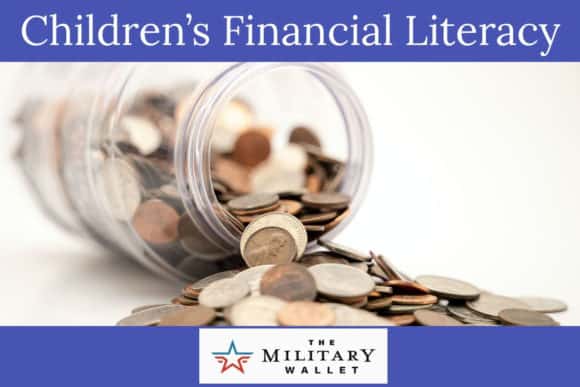Table of Contents
- 1. There is a Difference Between Needs and Wants
- 2. There is Never Going to Be Enough Money to Buy Everything
- 3. Money is Earned, Not Given
- More Ways to Teach Your Children Financial Lessons
- Set a Good Example
- Allow Children to Manage Their Own Money
- Let Them Make Mistakes
- Set Goals
- Teach the Difference Between Debit and Credit
- Talk About Retirement
- Start Your Children on the Right Financial Path
Disclosure: This article is sponsored by Navy Mutual, a non-profit, Veterans Service Organization (VSO).
Your children’s financial literacy starts with you. By teaching them to form good money habits when they are young, you will set them up for success later on. No matter what ages your children are, you can instill lessons about financial management that are relevant to them.
There are three main lessons that are important to convey to your children that will help them on the road toward financial literacy.
1. There is a Difference Between Needs and Wants
For an adult, it is easy to compartmentalize your budget into the items that you need to pay for — like your housing, utilities and food — and the items that you want to pay for — like date nights, new boots or a family vacation. For children, it’s not as easy.
Introduce the concept of budgeting to them by talking about the differences between needs and wants. They need to have a place to sleep at night, but they want to sleep in bunk beds. They need to eat green beans at dinner, but they want to skip straight to dessert. The grocery store can be a good place to reinforce this concept; as you are shopping, ask your children if the items you are putting into your cart are needs or wants, then explain how they are right or wrong.
ADVERTISEMENT
2. There is Never Going to Be Enough Money to Buy Everything
When everything is provided to them, it makes sense that children can develop the idea that money grows on trees. Teaching them from a young age that just because they want something does not always mean that they can get it will help them make smarter financial decisions later in life. The concept of an “opportunity cost” drives this home.
When your child has a finite amount of money and two purchases to choose from, they must choose one purchase at the expense of the other; they cannot have both at the same time. This concept is easier to teach when your child understands how money works and might be earning an allowance to make purchases of their own.
ADVERTISEMENT
3. Money is Earned, Not Given
By stressing the fact that money is something that needs to be earned when your children are young, you not only set them up to be financially literate, but you also begin instilling a good work ethic in them.
Instead of giving your children an allowance each week, consider giving them a list of chores that must be done and base their allowances on how much they accomplish. Teaching your children to be financially literate is a long process. It is not a skill that can be taught overnight. Finances are complex, especially when you get into retirement, investments and taxes. Though your elementary-school-aged children may not need to know about these topics yet, it’s important to prepare your teenage and adult children for “the real world” by giving them a primer on complex financial topics.
ADVERTISEMENT
More Ways to Teach Your Children Financial Lessons
Here are a few more tips to help your children become financially literate.
Set a Good Example
Your children learn from your behavior and habits, so be wise with your money. If they see you making frequent impulse purchases or living beyond your means, they are more likely to replicate that behavior than if they see you saving for retirement. Paying bills responsibly creates a positive example.
Allow Children to Manage Their Own Money
Whether you start with an allowance or help them open a savings account, let your children take control of their own finances. Help them balance their checkbooks or create small budgets. When their lessons are hands-on, they will become proficient faster.
Let Them Make Mistakes
When your children first learn the lesson of opportunity cost, they are likely to feel disappointed. When choosing between two items, they may have thought that one way or another they might get both. Or they may have instant buyer’s remorse and wish they had bought the other item. It’s important for you not to step in and give them more money or offer them alternatives. Once the lesson is learned, they’ll be more likely to think twice about their buying decisions in the future.
Set Goals
Goals are motivational, especially for children. Help them set realistic savings goals at all ages i.e., saving for a new video game or saving up to buy a used car) so that they can see where their money will be going. If you have young children who do not yet have bank accounts, using clear containers to store their change can help them visualize their progress.
Teach the Difference Between Debit and Credit
Plastic is plastic. But though credit cards and debit cards look similar, they behave in different ways. Teach your children that using a debit card is the same as paying with cash or a check – the money they spend is deducted from their account. Using a credit card is different. With credit cards, they can delay payment until the end of their statement period, but after that point, any remaining balance begins to collect interest, making a $40 purchase cost a lot more.
Talk About Retirement
When you talk to your children about saving money, stress the importance of saving for retirement. When your child is still a minor, you can open a custodial individual retirement arrangement (IRA) on their behalf; as soon as they earn income (as reported on a tax return), they can begin depositing money into the account.
The added benefit of a custodial IRA account is that, unlike other brokerage or trust accounts, like a Uniform Gift to Minors Act (UGMA) or Uniform Transfer to Minors Act (UTMA) account, assets in an IRA are not included on the Free Application for Federal Student Aid (FAFSA) when applying for college financial aid. Ownership of the account will automatically transition from you to your child when they reach the age of majority. This is typically 18 or 21 years old, depending on your location.
Start Your Children on the Right Financial Path
Only six states require high school students to take a standalone personal finance course before graduating. This leaves a significant gap in the financial literacy of young people, with parents picking up the slack. By giving your children financial lessons throughout their lives and starting when they are young, you are setting them up for success as they mature into adulthood.
It is a core part of Navy Mutual’s mission to educate members as well as the military and uniformed service community at large on matters of financial security. You can use our calculators to determine anything from how much you need to save for college to how long your retirement savings will last. We also provide life insurance and annuities to military families. For more information, call us at 800-628-6011, schedule a consultation, or get a quote today.




About the comments on this site:
These responses are not provided or commissioned by the bank advertiser. Responses have not been reviewed, approved or otherwise endorsed by the bank advertiser. It is not the bank advertiser’s responsibility to ensure all posts and/or questions are answered.